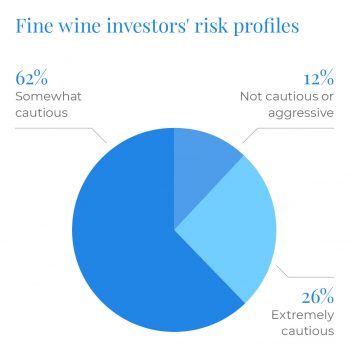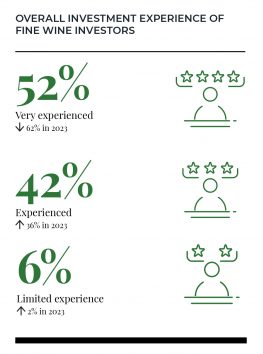Profiling the fine wine investor in 2024
- Nearly 30% of the UK’s high-net-worth (HNW) investors incorporate fine wine into their portfolios.
- They tend to be cautious, but in 2024, investors with balanced risk profiles are increasingly dipping into the world of drinkable assets.
- Since last year, the demographic has shifted a little towards less experienced investors, indicating that new HNWs could be getting involved with fine wine.
Fine wine, historically a passion-driven investment, has predominantly attracted older, seasoned investors interested in both enjoying and preserving their wealth. However, recent trends indicate a shift as younger, less experienced investors in the UK are increasingly drawn to fine wine for different reasons – not least because the fine wine market has become more accessible.
Fine wine allocations in investment portfolios
In 2024, nearly 30% of the UK’s high-net-worth (HNW) investors incorporate fine wine into their portfolios.
66% are allocating up to 10% of their portfolio to fine wine, with the remaining 34% reserving over 11%. In 2024, 2% are allocating over a third of their portfolio to fine wine. This trend reveals a more polarising wealth distribution, considering that last year just half of wealth managers kept fine wine allocations under 10%, but none invested over 30% of their wealth in fine wine.
Investors’ risk profiles
Fine wine investors tend to be the cautious type. According to our 2024 wealth management survey, 88% of respondents incorporate fine wine into portfolios for investors with a ‘somewhat cautious’ or ‘extremely cautious’ risk tolerance. As fine wine can help provide stability, it can have a calming influence on overall performance.
Cautious investment portfolios also generally contain a greater proportion of bonds and cash-like assets. The inflation-resistance of wine can help to buffer out some of the risks this can present over the long term.
The remaining 12% tend to use wine for balanced portfolios (compared to 10% last year). None of the respondents use the asset for clients with higher risk tolerances.
In 2024, around 2% of respondents are using fine wine for ‘somewhat aggressive’ portfolios. As fine wine has historically exhibited strong growth during recessions and periods of high inflation, it could easily be used to diversify high-risk portfolios.

Investment experience
In line with this trend, over the past 12 months, fine wine has started to move beyond the realm of ‘very experienced’ investors. The slow spread towards ‘experienced’ and ‘somewhat experienced’ investors suggests that fine wine is becoming a more mainstream asset.
This move could be prompted by the demand to invest in sustainable and low-carbon assets. As this trend is particularly strong with younger investors, it fits that they could have less experience.
This year, 52% of UK wealth managers rated their investment clients as ‘very experienced’ with fine wine, compared to 62% in 2023. Meanwhile, clients with medium or limited experience grew their fine wine investments.

Fine wine has long been perceived as an exclusive, somewhat intimidating investment, traditionally reserved for a privileged few. But as our recent research indicates, attitudes are slowly changing.
For more information on the changing fine wine investors’ demographics, read our exclusive Wealth Report 2024: UK Edition.
WineCap’s independent market analysis showcases the value of portfolio diversification and the stability offered by investing in wine. Speak to one of our wine investment experts and start building your portfolio. Schedule your free consultation today.
Three reasons why the Brexit deal will prevent customers from paying more for their wine.
Ever since the UK voted to leave the European Union in 2016, trade talks and negotiations between the two sides had been full of uncertainty, posturing and brinkmanship which at times made it feel like a deal was unobtainable. So, the news that a trade deal – now ratified by the UK Parliament - had been struck on Christmas Eve last year was met with welcome relief across all industry sectors on both sides of the Channel and especially by those looking to invest in wine.
1. The costly VI-1 import documentation for UK and EU wines is no longer going to be introduced in July as previously planned. Taking its place will be a straightforward Wine Import Certificate which asks for basic producer and product information. This means far less admin and fees for wine importers, which in turn means no extra costs will be passed on to customers.
2. Crucially, wines will not have to undergo lab assessment for the new Wine Import Certificate. Submitting wines for lab analysis would have caused backlogs of wines which would have created frustrating shipment delays.
3. While UK wine importers are going to have to get to grips with new processes and forms over the coming months, this is just part of the anticipated bedding-in period which will become second nature as time goes on and as new processes are established.
With the previous uncertainty around Brexit having disappeared with the end of the transition period and with 2021 looking to mirror previous years of healthy returns for fine wine, contact us to speak to one of our advisors about creating your portfolio to invest in wine.
Sign up to our newsletter to keep in the know about market developments
Subscribe to our newsletter
T: UK +44 207 060 7500T: US +1 310 310 7610 | hello@winecap.com
Registered Office: WineCap Limited, Salisbury House, London, United Kingdom, EC2M 5SQ
WineCap Limited | Company No. 08480079 | VAT No. GB174 8533 80 | AWRS No. XCAW00000119418 | WOWGR: GBOG174853300
Copyright © 2025 WineCap Limited
T: UK +44 207 060 7500 | T: US +1 310 310 7610 | hello@winecap.com
Registered Office: WineCap Limited, Salisbury House, London, United Kingdom, EC2M 5SQ
WineCap Limited | Company No. 08480079 | VAT No. GB174 8533 80 | AWRS No. XCAW00000119418 | WOWGR: GBOG174853300
Copyright © 2025 WineCap Limited